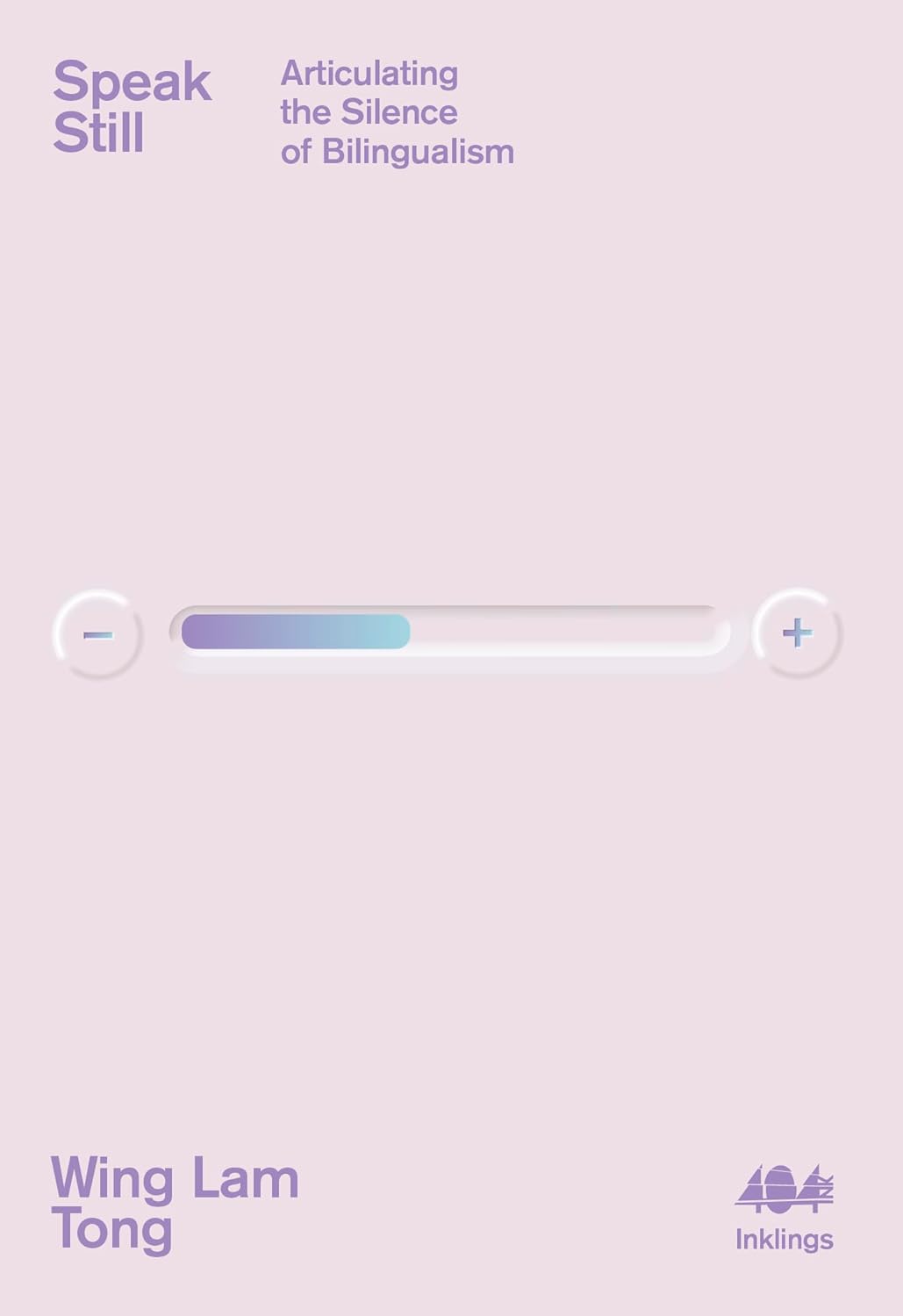Published July 21st, 2025
Interview
by Tim Tim Cheng
Wing Lam Tong is a Hong Kong-born writer based in the UK. With a background in literature and cultural theory, her work explores themes of bilingualism, migration, and the emotional landscapes of everyday life. After moving to the UK in 2022, she began writing Speak Still: Articulating the Silence of Bilingualism (404 Ink, 2025) as a way to navigate the silences and contradictions that come with living between languages.
I met Wing Lam via a common friend in London. Wing Lam hosted us with a home-cooked dinner. Over oxtail stew, chicken and mushroom rice, soup, and booze, I felt adopted by this group of close friends, especially amidst my constant moves between England and Scotland. Wing Lam, like many migrants, started cooking out of homesickness and necessity, and was pleasantly surprised by her new skills. At the end of the gathering, she gifted everyone dried flowers from her graduation bouquet.
We have since stayed in touch on Instagram, where I am often struck by her writing in Chinese. The tone is what I would call 柔美, an adjective that I would loosely translate as graceful. When the news of Wing Lam’s book, Speak Still, was out, I knew it would be a personal must-read. The byline of the book, Articulating the Silence of Bilingualism, also spoke to our common linguistic upbringing in Hong Kong, where the languages we use — Cantonese, English, Mandarin, among many others — make and unmake us.

Tim Tim Cheng: What motivated you to write Speak Still?
Wing Lam Tong: I wrote Speak Still to find my bearings in words at a time when I felt lost and alone in an unfamiliar language realm.
I moved from Hong Kong to the UK in 2022 for a Master’s degree and to focus on thinking and writing about femininity, in-betweenness, and the politics of everyday life. I imagined a lot about how the move was going to feel: how a waterside walk would now mean one by the River Thames instead of Victoria Harbour; how summer would feel different on the skin without the subtropical humidity and what that would mean to my seasonal bodily memories. What I didn’t expect, however, was that I would feel the displacement most deeply in my language.
Soon after the move, I found myself at a loss for words. I didn’t quite feel like myself when I introduced myself to my new friends. I also couldn’t quite write. It wasn’t exactly a problem of language proficiency; it was the change in my speech habits that affected me. I used to be able to draw from a mix of Chinese and English to feel, to speak, and to make connections; now I had access to English only. Psychoanalyst Julia Kristeva puts it in Stranger to Ourselves (Columbia University Press, 2024) beautifully: Not speaking one’s mother tongue, she thinks, is like becoming a stranger to oneself, entering into a realm of silence.
I wanted to reconnect with myself and to break that silence, so I started to articulate that speechlessness. Speak Still is a record of this process of verbalising a loss to find possibilities of recovery.
Tim Tim: I was struck by a question you raised: “why am I estranged from a language I have known since childhood?” (p. 8). Do you still feel estranged from English after all the writing and editing?
Wing Lam: As we know, English is not just a language in Hong Kong. It’s a tongue intricately intertwined with the city’s colonial history, a survival skill one has to acquire to get through the ultra-competitive education system, an overly handy socio-economic class marker. It’s a paradox: We are trained to approach the language with such pragmatism that we can be fluent in the language for exams or for work, and yet become tongue-tied when it comes to articulating who we are and how we feel. In Hong Kong, English is a language that makes us eloquent and speechless all at once.
When I speak of the feelings of estrangement, I’m imagining it as a distance put between me and my English. It’s a gap structured by cultural and class differences. Writing and editing Speak Still means exposing myself to that distance and the contradictions that pervade it. I put myself in the position of a cartographer. In order to map out this distance, with the hope of narrowing it down, what are the silences that I need to mark along the way? Crossing that distance is both emotionally and intellectually challenging. It is a lot of self-questioning when I reflect on my English language education. I have to muster up the courage to honestly answer the questions raised. Why didn’t I feel comfortable speaking English — because I didn’t sound native? What did I see as nativeness? When I eventually came to speak, then, did I perpetuate the silencing of others?
So… coming back to your question, does the distance still exist? I think so, but it’s less intimidating now for me to go through it. There’s still a lot of work to do until I can spot and define all the overgrown paths and hidden streams along the way. But now that I’ve finished my first journey, I hope that will make all future journeys easier.
Tim Tim: In the book, you asked if we could “articulate all the contradictions in a language that simultaneously elevates and subjugates us” (p. 26). What do you think of English as a colonial and/or post-colonial language? Is there a way forward?
Wing Lam: I think of English as a heterogenous, ex-centric language that is constantly evolving.
I went to the Sadler’s Wells Theatre the other day to see Northern Ballet’s adaptation of Jane Eyre. It was a stunning performance, and I enjoyed the show particularly because I loved Charlotte Brontë’s Jane Eyre as a teenager. I was 14 or 15 when I first came across a Chinese translation of the book (《簡愛》). I got so fascinated by the story that I wanted to be able to read the original text one day. I eventually read literature at university. Jane Eyre inspired my appreciation of the English language, no doubt; however, the language of the 19th century text is so deeply embedded in the history of imperialism that there’s no way I can overlook its problems. If a beloved story is told in a language that enables and enchains us, what should we do?
I’m struck by what Dominican-British author Jean Rhys did: She rewrote Jane Eyre to reclaim the language and the story on her own terms. In her 1966 novel, Wide Sargasso Sea, Rhys wrote a prequel to the colonial narrative. In that story, she gave voice to the characters silenced by colonialism via a variation of Englishes and creoles to subvert the idea of a nativist standard. This is a brilliant postcolonial critique. To me, the post in postcoloniality is not simply an indicator of sequentiality, but more importantly a will to expand and destabilise. Expand English until it can accommodate all the different ways we speak. Destabilise the language to critique the imperialism that haunts it. I hope I have embodied the same revisionary energy in Speak Still to break down some hierarchical binaries around language created by colonialism. To go beyond — that’s the way forward.
Tim Tim: Do you think you are different when you operate in Chinese, compared to English?
Wing Lam: Ah, I have to say yes to this because I’ve been telling all my non-Chinese-speaking friends that I’m actually a much funnier person in Cantonese!
I do think we all operate differently depending on the language we’re using. Some scholars have hypothesised it as linguistic relativity: Each language embodies a specific worldview and it changes how its speaker perceives the world. Personally, I think of it more as an emotional granularity: Each language gives me different words to strike different emotional chords. For example, it’s only in Chinese that I can express this sadness of 無可奈何. No English word can sufficiently help me articulate that particular sense of impossibility and futility. Meanwhile, it’s only in English I can say I’m sorry to express this sympathy for others’ suffering in a poignancy best captured by Wisława Szymborska’s poem “Under One Small Star”: “Forgive me, distant wars, for bringing flowers home./Forgive me, open wounds, for pricking my finger.”
This is the privilege of being bilingual: It allows me to pick and choose from the different languages in my repertoire to best describe how I feel. We seldom operate in only one language. We’re often translanguaging, and that helps us get as close as possible to how we truly feel and who we truly are.

Tim Tim: In Speak Still, you proposed that:
“To enter the realm of silence, in this sense, is to willingly submit oneself to potential changes that incessantly contest static homogeneity. In bilingualism, this realm of silence could be found between the dynamic peripheries of the languages. If we immerse ourselves in this linguistic in-betweenness, its ebb and flow will reveal to us the subdued paradoxes and possibilities inherent in the way we communicate with each other. If we pay enough attention, we will see how the in-between speakers are also slowly eroding cultural monism in their everyday oscillation between silence and speech.” (p. 15)
Hong Kong has an impossible relationship with silence. While our dense cityscape and fast pace of living leave almost no room for silence, our on-going censorship has magnified it. When were the first and last times you encountered silence?
Wing Lam: Silence is a curious thing, isn’t it? When we think about this impossibility you mentioned, silence is actually strikingly similar to its outspoken counterpart. Like language, silence is full of contradictions, be it political or personal. It can embody oppression, as in censorship; or it can embody justice, as in the right to silence. Silence can also represent a chilling effect, as in 噤若寒蟬 (literal meaning: silent like a cicada in the cold; extended meaning: afraid to speak); or it can represent an unassuming kindness, as in 潤物無聲 (meaning: to nourish everything in silence). I see silence as a malleable, multifarious concept, and I’m keen to reclaim it as an interlocutor that can interrupt and expand a rigid, homogenous narrative.
Things changed when I started seeing English beyond the binary. In the book, I propose understanding English as a lingua franca — a common language chosen for communication that is constantly evolving to suit its speakers’ needs. When I pause mid-sentence to look for a word in my repertoire now, I see it as an active effort to build connection with someone who’s not from my culture. Those pauses used to be unwanted obstacles, but now they’re reclaimed as meaningful silences that enable conversations that build friendships. This in turn enables new imaginations of the relationship between silence and speech to diversify the definition of what a “language” is.
Nationality: Chinese (Hongkong)
First Language(s): Cantonese
Second Language(s):
English,
Mandarin
Supported by:


Comments on "Soft Susurrus — An Interview with Wing Lam Tong"
Please log in to submit a comment.
Login